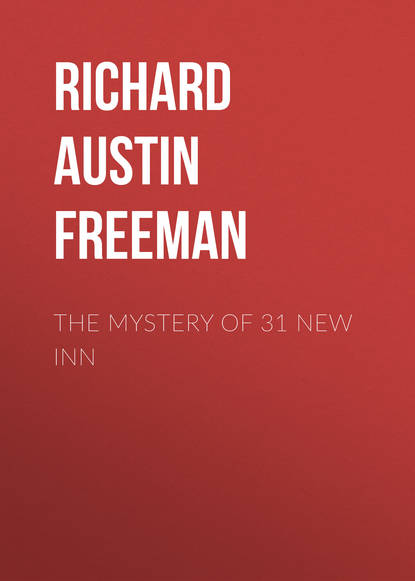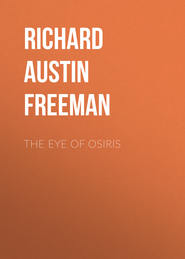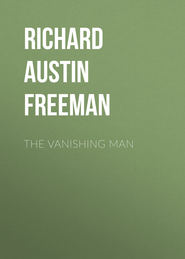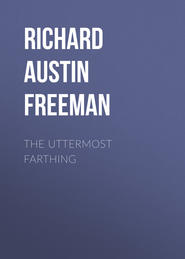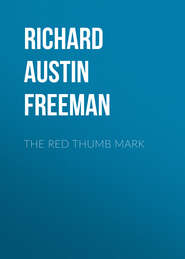По всем вопросам обращайтесь на: info@litportal.ru
(©) 2003-2024.
✖
The Mystery of 31 New Inn
Настройки чтения
Размер шрифта
Высота строк
Поля
"No," Thorndyke agreed. "And, as you have said, the manifest intention of the testator was to leave the bulk of his property to Mr. Stephen. So we may take it as virtually certain that Mr. Jeffrey had no knowledge of the fact that he was a beneficiary under his sister's will."
"Yes," said Mr. Marchmont, "I think we may take that as nearly certain."
"With reference to the second will," said Thorndyke, "I suppose there is no need to ask whether the document itself has been examined; I mean as to its being a genuine document and perfectly regular?"
Mr. Marchmont shook his head sadly.
"No," he said, "I am sorry to say that there can be no possible doubt as to the authenticity and regularity of the document. The circumstances under which it was executed establish its genuineness beyond any question."
"What were those circumstances?" Thorndyke asked.
"They were these: On the morning of the twelfth of November last, Mr. Jeffrey came to the porter's lodge with a document in his hand. 'This,' he said, 'is my will. I want you to witness my signature. Would you mind doing so, and can you find another respectable person to act as the second witness?' Now it happened that a nephew of the porter's, a painter by trade, was at work in the Inn. The porter went out and fetched him into the lodge and the two men agreed to witness the signature. 'You had better read the will,' said Mr. Jeffrey. 'It is not actually necessary, but it is an additional safeguard and there is nothing of a private nature in the document.' The two men accordingly read the document, and, when Mr. Jeffrey had signed it in their presence, they affixed their signatures; and I may add that the painter left the recognizable impressions of three greasy fingers."
"And these witnesses have been examined?"
"Yes. They have both sworn to the document and to their own signatures, and the painter recognized his finger-marks."
"That," said Thorndyke, "seems to dispose pretty effectually of any question as to the genuineness of the will; and if, as I gather, Mr. Jeffrey came to the lodge alone, the question of undue influence is disposed of too."
"Yes," said Mr. Marchmont. "I think we must pass the will as absolutely flawless."
"It strikes me as rather odd," said Thorndyke, "that Jeffrey should have known so little about his sister's intentions. Can you explain it, Mr. Blackmore?"
"I don't think that it is very remarkable," Stephen replied. "I knew very little of my aunt's affairs and I don't think my uncle Jeffrey knew much more, for he was under the impression that she had only a life interest in her husband's property. And he may have been right. It is not clear what money this was that she left to my uncle. She was a very taciturn woman and made few confidences to anyone."
"So that it is possible," said Thorndyke, "that she, herself, may have acquired this money recently by some bequest?"
"It is quite possible," Stephen answered.
"She died, I understand," said Thorndyke, glancing at the notes that he had jotted down, "two days before Mr. Jeffrey. What date would that be?"
"Jeffrey died on the fourteenth of March," said Marchmont.
"So that Mrs. Wilson died on the twelfth of March?"
"That is so," Marchmont replied; and Thorndyke then asked:
"Did she die suddenly?"
"No," replied Stephen; "she died of cancer. I understand that it was cancer of the stomach."
"Do you happen to know," Thorndyke asked, "what sort of relations existed between Jeffrey and his brother John?"
"At one time," said Stephen, "I know they were not very cordial; but the breach may have been made up later, though I don't know that it actually was."
"I ask the question," said Thorndyke, "because, as I dare say you have noticed, there is, in the first will, some hint of improved relations. As it was originally drawn that will makes Mr. Stephen the sole legatee. Then, a little later, a codicil is added in favour of John, showing that Jeffrey had felt the necessity of making some recognition of his brother. This seems to point to some change in the relations, and the question arises: if such a change did actually occur, was it the beginning of a new and further improving state of feeling between the two brothers? Have you any facts bearing on that question?"
Marchmont pursed up his lips with the air of a man considering an unwelcome suggestion, and, after a few moments of reflection, answered:
"I think we must say 'yes' to that. There is the undeniable fact that, of all Jeffrey's friends, John Blackmore was the only one who knew that he was living in New Inn."
"Oh, John knew that, did he?"
"Yes, he certainly did; for it came out in the evidence that he had called on Jeffrey at his chambers more than once. There is no denying that. But, mark you!" Mr. Marchmont added emphatically, "that does not cover the inconsistency of the will. There is nothing in the second will to suggest that Jeffrey intended materially to increase the bequest to his brother."
"I quite agree with you, Marchmont. I think that is a perfectly sound position. You have, I suppose, fully considered the question as to whether it would be possible to set aside the second will on the ground that it fails to carry out the evident wishes and intentions of the testator?"
"Yes. My partner, Winwood, and I went into that question very carefully, and we also took counsel's opinion—Sir Horace Barnaby—and he was of the same opinion as ourselves; that the court would certainly uphold the will."
"I think that would be my own view," said Thorndyke, "especially after what you have told me. Do I understand that John Blackmore was the only person who knew that Jeffrey was in residence at New Inn?"
"The only one of his private friends. His bankers knew and so did the officials from whom he drew his pension."
"Of course he would have to notify his bankers of his change of address."
"Yes, of course. And à propos of the bank, I may mention that the manager tells me that, of late, they had noticed a slight change in the character of Jeffrey's signature—I think you will see the reason of the change when you hear the rest of his story. It was very trifling; not more than commonly occurs when a man begins to grow old, especially if there is some failure of eyesight."
"Was Mr. Jeffrey's eyesight failing?" asked Thorndyke.
"Yes, it was, undoubtedly," said Stephen. "He was practically blind in one eye and, in the very last letter that I ever had from him, he mentioned that there were signs of commencing cataract in the other."
"You spoke of his pension. He continued to draw that regularly?"
"Yes; he drew his allowance every month, or rather, his bankers drew it for him. They had been accustomed to do so when he was abroad, and the authorities seem to have allowed the practice to continue."
Thorndyke reflected a while, running his eye over the notes on the slips of paper in his hand, and Marchmont surveyed him with a malicious smile. Presently the latter remarked:
"Methinks the learned counsel is floored."
Thorndyke laughed. "It seems to me," he retorted, "that your proceedings are rather like those of the amiable individual who offered the bear a flint pebble, that he might crack it and extract the kernel. Your confounded will seems to offer no soft spot on which one could commence an attack. But we won't give up. We seem to have sucked the will dry. Let us now have a few facts respecting the parties concerned in it; and, as Jeffrey is the central figure, let us begin with him and the tragedy at New Inn that formed the starting-point of all this trouble."
Chapter VI
Jeffrey Blackmore, Deceased
Having made the above proposition, Thorndyke placed a fresh slip of paper on the blotting pad on his knee and looked inquiringly at Mr. Marchmont; who, in his turn, sighed and looked at the bundle of documents on the table.
"What do you want to know?" he asked a little wearily.
"Everything," replied Thorndyke. "You have hinted at circumstances that would account for a change in Jeffrey's habits and that would explain an alteration in the character of his signature. Let us have those circumstances. And, if I might venture on a suggestion, it would be that we take the events in the order in which they occurred or in which they became known."
"That's the worst of you, Thorndyke," Marchmont grumbled. "When a case has been squeezed out to the last drop, in a legal sense, you want to begin all over again with the family history of every one concerned and a list of his effects and household furniture. But I suppose you will have to be humoured; and I imagine that the best way in which to give you the information you want will be to recite the circumstances surrounding the death of Jeffrey Blackmore. Will that suit you?"
"Perfectly," replied Thorndyke; and thereupon Marchmont began:
"The death of Jeffrey Blackmore was discovered at about eleven o'clock in the morning of the fifteenth of March. It seems that a builder's man was ascending a ladder to examine a gutter on number 31, New Inn, when, on passing a second-floor window that was open at the top, he looked in and perceived a gentleman lying on a bed. The gentleman was fully clothed and had apparently lain down on the bed to rest; at least so the builder thought at the time, for he was merely passing the window on his way up, and, very properly, did not make a minute examination. But when, some ten minutes later, he came down and saw that the gentleman was still in the same position, he looked at him more attentively; and this is what he noticed—but perhaps we had better have it in his own words as he told the story at the inquest.
"'When I came to look at the gentleman a bit more closely, it struck me that he looked rather queer. His face looked very white, or rather pale yellow, like parchment, and his mouth was open. He did not seem to be breathing. On the bed by his side was a brass object of some kind—I could not make out what it was—and he seemed to be holding some small metal object in his hand. I thought it rather a queer affair, so, when I came down I went across to the lodge and told the porter about it. The porter came out across the square with me and I showed him the window. Then he told me to go up the stairs to Mr. Blackmore's chambers on the second pair and knock and keep on knocking until I got an answer. I went up and knocked and kept on knocking as loud as I could, but, though I fetched everybody out of all the other chambers in the house, I couldn't get any answer from Mr. Blackmore. So I went downstairs again and then Mr. Walker, the porter, sent me for a policeman.
"Yes," said Mr. Marchmont, "I think we may take that as nearly certain."
"With reference to the second will," said Thorndyke, "I suppose there is no need to ask whether the document itself has been examined; I mean as to its being a genuine document and perfectly regular?"
Mr. Marchmont shook his head sadly.
"No," he said, "I am sorry to say that there can be no possible doubt as to the authenticity and regularity of the document. The circumstances under which it was executed establish its genuineness beyond any question."
"What were those circumstances?" Thorndyke asked.
"They were these: On the morning of the twelfth of November last, Mr. Jeffrey came to the porter's lodge with a document in his hand. 'This,' he said, 'is my will. I want you to witness my signature. Would you mind doing so, and can you find another respectable person to act as the second witness?' Now it happened that a nephew of the porter's, a painter by trade, was at work in the Inn. The porter went out and fetched him into the lodge and the two men agreed to witness the signature. 'You had better read the will,' said Mr. Jeffrey. 'It is not actually necessary, but it is an additional safeguard and there is nothing of a private nature in the document.' The two men accordingly read the document, and, when Mr. Jeffrey had signed it in their presence, they affixed their signatures; and I may add that the painter left the recognizable impressions of three greasy fingers."
"And these witnesses have been examined?"
"Yes. They have both sworn to the document and to their own signatures, and the painter recognized his finger-marks."
"That," said Thorndyke, "seems to dispose pretty effectually of any question as to the genuineness of the will; and if, as I gather, Mr. Jeffrey came to the lodge alone, the question of undue influence is disposed of too."
"Yes," said Mr. Marchmont. "I think we must pass the will as absolutely flawless."
"It strikes me as rather odd," said Thorndyke, "that Jeffrey should have known so little about his sister's intentions. Can you explain it, Mr. Blackmore?"
"I don't think that it is very remarkable," Stephen replied. "I knew very little of my aunt's affairs and I don't think my uncle Jeffrey knew much more, for he was under the impression that she had only a life interest in her husband's property. And he may have been right. It is not clear what money this was that she left to my uncle. She was a very taciturn woman and made few confidences to anyone."
"So that it is possible," said Thorndyke, "that she, herself, may have acquired this money recently by some bequest?"
"It is quite possible," Stephen answered.
"She died, I understand," said Thorndyke, glancing at the notes that he had jotted down, "two days before Mr. Jeffrey. What date would that be?"
"Jeffrey died on the fourteenth of March," said Marchmont.
"So that Mrs. Wilson died on the twelfth of March?"
"That is so," Marchmont replied; and Thorndyke then asked:
"Did she die suddenly?"
"No," replied Stephen; "she died of cancer. I understand that it was cancer of the stomach."
"Do you happen to know," Thorndyke asked, "what sort of relations existed between Jeffrey and his brother John?"
"At one time," said Stephen, "I know they were not very cordial; but the breach may have been made up later, though I don't know that it actually was."
"I ask the question," said Thorndyke, "because, as I dare say you have noticed, there is, in the first will, some hint of improved relations. As it was originally drawn that will makes Mr. Stephen the sole legatee. Then, a little later, a codicil is added in favour of John, showing that Jeffrey had felt the necessity of making some recognition of his brother. This seems to point to some change in the relations, and the question arises: if such a change did actually occur, was it the beginning of a new and further improving state of feeling between the two brothers? Have you any facts bearing on that question?"
Marchmont pursed up his lips with the air of a man considering an unwelcome suggestion, and, after a few moments of reflection, answered:
"I think we must say 'yes' to that. There is the undeniable fact that, of all Jeffrey's friends, John Blackmore was the only one who knew that he was living in New Inn."
"Oh, John knew that, did he?"
"Yes, he certainly did; for it came out in the evidence that he had called on Jeffrey at his chambers more than once. There is no denying that. But, mark you!" Mr. Marchmont added emphatically, "that does not cover the inconsistency of the will. There is nothing in the second will to suggest that Jeffrey intended materially to increase the bequest to his brother."
"I quite agree with you, Marchmont. I think that is a perfectly sound position. You have, I suppose, fully considered the question as to whether it would be possible to set aside the second will on the ground that it fails to carry out the evident wishes and intentions of the testator?"
"Yes. My partner, Winwood, and I went into that question very carefully, and we also took counsel's opinion—Sir Horace Barnaby—and he was of the same opinion as ourselves; that the court would certainly uphold the will."
"I think that would be my own view," said Thorndyke, "especially after what you have told me. Do I understand that John Blackmore was the only person who knew that Jeffrey was in residence at New Inn?"
"The only one of his private friends. His bankers knew and so did the officials from whom he drew his pension."
"Of course he would have to notify his bankers of his change of address."
"Yes, of course. And à propos of the bank, I may mention that the manager tells me that, of late, they had noticed a slight change in the character of Jeffrey's signature—I think you will see the reason of the change when you hear the rest of his story. It was very trifling; not more than commonly occurs when a man begins to grow old, especially if there is some failure of eyesight."
"Was Mr. Jeffrey's eyesight failing?" asked Thorndyke.
"Yes, it was, undoubtedly," said Stephen. "He was practically blind in one eye and, in the very last letter that I ever had from him, he mentioned that there were signs of commencing cataract in the other."
"You spoke of his pension. He continued to draw that regularly?"
"Yes; he drew his allowance every month, or rather, his bankers drew it for him. They had been accustomed to do so when he was abroad, and the authorities seem to have allowed the practice to continue."
Thorndyke reflected a while, running his eye over the notes on the slips of paper in his hand, and Marchmont surveyed him with a malicious smile. Presently the latter remarked:
"Methinks the learned counsel is floored."
Thorndyke laughed. "It seems to me," he retorted, "that your proceedings are rather like those of the amiable individual who offered the bear a flint pebble, that he might crack it and extract the kernel. Your confounded will seems to offer no soft spot on which one could commence an attack. But we won't give up. We seem to have sucked the will dry. Let us now have a few facts respecting the parties concerned in it; and, as Jeffrey is the central figure, let us begin with him and the tragedy at New Inn that formed the starting-point of all this trouble."
Chapter VI
Jeffrey Blackmore, Deceased
Having made the above proposition, Thorndyke placed a fresh slip of paper on the blotting pad on his knee and looked inquiringly at Mr. Marchmont; who, in his turn, sighed and looked at the bundle of documents on the table.
"What do you want to know?" he asked a little wearily.
"Everything," replied Thorndyke. "You have hinted at circumstances that would account for a change in Jeffrey's habits and that would explain an alteration in the character of his signature. Let us have those circumstances. And, if I might venture on a suggestion, it would be that we take the events in the order in which they occurred or in which they became known."
"That's the worst of you, Thorndyke," Marchmont grumbled. "When a case has been squeezed out to the last drop, in a legal sense, you want to begin all over again with the family history of every one concerned and a list of his effects and household furniture. But I suppose you will have to be humoured; and I imagine that the best way in which to give you the information you want will be to recite the circumstances surrounding the death of Jeffrey Blackmore. Will that suit you?"
"Perfectly," replied Thorndyke; and thereupon Marchmont began:
"The death of Jeffrey Blackmore was discovered at about eleven o'clock in the morning of the fifteenth of March. It seems that a builder's man was ascending a ladder to examine a gutter on number 31, New Inn, when, on passing a second-floor window that was open at the top, he looked in and perceived a gentleman lying on a bed. The gentleman was fully clothed and had apparently lain down on the bed to rest; at least so the builder thought at the time, for he was merely passing the window on his way up, and, very properly, did not make a minute examination. But when, some ten minutes later, he came down and saw that the gentleman was still in the same position, he looked at him more attentively; and this is what he noticed—but perhaps we had better have it in his own words as he told the story at the inquest.
"'When I came to look at the gentleman a bit more closely, it struck me that he looked rather queer. His face looked very white, or rather pale yellow, like parchment, and his mouth was open. He did not seem to be breathing. On the bed by his side was a brass object of some kind—I could not make out what it was—and he seemed to be holding some small metal object in his hand. I thought it rather a queer affair, so, when I came down I went across to the lodge and told the porter about it. The porter came out across the square with me and I showed him the window. Then he told me to go up the stairs to Mr. Blackmore's chambers on the second pair and knock and keep on knocking until I got an answer. I went up and knocked and kept on knocking as loud as I could, but, though I fetched everybody out of all the other chambers in the house, I couldn't get any answer from Mr. Blackmore. So I went downstairs again and then Mr. Walker, the porter, sent me for a policeman.





